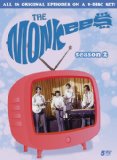| Reviews & Columns |
|
Reviews DVD TV on DVD Blu-ray 4K UHD International DVDs In Theaters Reviews by Studio Video Games Features Collector Series DVDs Easter Egg Database Interviews DVD Talk Radio Feature Articles Columns Anime Talk DVD Savant Horror DVDs The M.O.D. Squad Art House HD Talk Silent DVD
|
DVD Talk Forum |
|
|
| Resources |
|
DVD Price Search Customer Service #'s RCE Info Links |
|
Columns
|
|
|
Monkees: Season 2, The
Back for more, wackier adventures with the pop primates
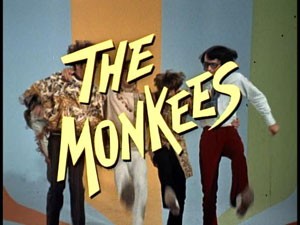 Reviewer's Bias*
Reviewer's Bias*
Loves: Good sitcoms
Likes: The Monkees
Dislikes: Repetition, wackiness for wackiness' sake, '60s psychedelia
Hates: The concept of "out of print"
The Story So Far...
Brought together in the mid-1960s for the purpose of making a musical TV show, Mike Nesmith, Davy Jones, Micky Dolenz and Peter Tork instead developed an honest-to-goodness band and became stars of both stage and screen, even earning the respect and admiration of the band they were based on, The Beatles. Though the series lasted just two seasons, they've been active, on and off, for decades and are fondly remembered today, as much for their music as for the show. There have been several DVD releases of the series, both season sets and best-of collections and DVDTalk has reviews of the two season sets released in 2003, and the 2011 re-release of Season One.
The Show
I recently reviewed the second season of Modern Family and I remarked that normally the second season of a television show is a chance to change things and improve upon its past. Obviously, the show did something right to make it to a second season, and then there's a chance to make it even better. Modern Family received such acclaim right out of the gate though that it kept the status quo, building on its successes and giving fans more of what they liked the first time. The Monkees was not that kind of series. The Monkees instead, took advantage of the second season their immense popularity brought, and imploded the series in a stunning blaze of paisley-patterned glory.
The first season had established a formula that worked, taking this gang of likable musicians, throwing hard luck in their path and watching how they got over it, while enjoying their music and the spoils of their labors (namely girls.) Each show would spotlight some of their catchy music and their distinct personalities, while giving flooding the thin storylines with enough industrial-strength comedy to keep audience of all ages smiling, if not laughing. It truly was a feel-good show, but apparently the good feelings stayed in front of the cameras, as talk of strife behind the scenes and a potential break-up led to changes, including a grab for more creative control on the part of the core four, all very artistic personalities who grew tired of being seen as props hired to perform like clowning karaoke singers.
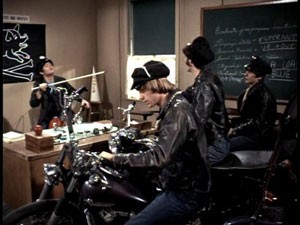 Well, with that shift in creative control, the series changed gears dramatically. Occasionally, a star actor, hired for one particular talent, will feel the need to spread their wings and try something different, feeling the desire to take more control over their art and express their creativity more directly. Occasionally, that works and you end up with actors who successfully transition behind the camera. But the Monkees were not those actors (at least not at first, as they've all been rather successful in life, both artistically and personally.) The series went from a fun, silly sitcom with fun silly music, to something of a network-broadcast psychedelic freak-out, where all logic and reality were kicked to the curb, the characters/actors openly criticized the show and network on the show, and the series lost its reason for being, getting sidetracked by the group's desires to do something different, like the rather serious "The Devil and Peter Tork" or bringing in Frank Zappa for a sit-down chat. It was utterly different from a) the first season and b) anything else on television, but the guys had the popularity to pull off such a coup.
Well, with that shift in creative control, the series changed gears dramatically. Occasionally, a star actor, hired for one particular talent, will feel the need to spread their wings and try something different, feeling the desire to take more control over their art and express their creativity more directly. Occasionally, that works and you end up with actors who successfully transition behind the camera. But the Monkees were not those actors (at least not at first, as they've all been rather successful in life, both artistically and personally.) The series went from a fun, silly sitcom with fun silly music, to something of a network-broadcast psychedelic freak-out, where all logic and reality were kicked to the curb, the characters/actors openly criticized the show and network on the show, and the series lost its reason for being, getting sidetracked by the group's desires to do something different, like the rather serious "The Devil and Peter Tork" or bringing in Frank Zappa for a sit-down chat. It was utterly different from a) the first season and b) anything else on television, but the guys had the popularity to pull off such a coup.
Nesmith in particular took on something of an anarchistic bent in how he approached the series, even going missing for several episodes, and the show reflected that tone, diving deeper into the bizarre, flipping the screen or cutting from a moment for no apparent good reason, or just simply acknowledging they were actors while maintaining the tenuous reality of the characters' world (reflecting what was going on off-screen if you believe the commentaries on this set.) It feels like the kind of thing you'd describe as the last act of four desperate men, who were willing to throw it all away, despite being almost as big as The Beatles. As a result, you've got episodes about the group randomly ending up in Mexico, a desert island, Texas and Paris or even battling space aliens and scary monsters. Meanwhile, if anyone would like to explain exactly what Rip Taylor was trying to do with his fey, audience-addressing roulette wheel-operator in "The Monkees on the Wheel", your humble reviewer will be able to sleep at night. Yes, it was a different time, but not this different.
Though this view of the second season is a bit harsh, there are some fun parts of this run. Some episodes even harkened back to the show's more innocent times, like "Some Like it Lukewarm" (where Davy dresses like a girl so the band can win a contest) or "The Monkees' Paw (pitting the group against a magician whose gig they took.) These episodes also showed the group's instincts weren't bad, as they eliminated the laugh track about halfway into the season. The music was still top-notch, with "Love is Only Sleeping" being among the best songs the group ever performed, while "Pleasant Valley Sunday," "Daydream Believer" and "Valleri" are undeniable hit songs. This season also features what's probably the best romp (proto-music videos featured in each episode) of the entire series, a trippy pop-art presentation of Dolenz' jazzy "Goin' Down." It's not the best performance on the show, but it's the best overall package, thanks to a simple concept, mixing instruments and Dolenz' soulful performance against a stark black background. Unfortunately, this kind of simplicity was rare as the show slid toward the finish line.
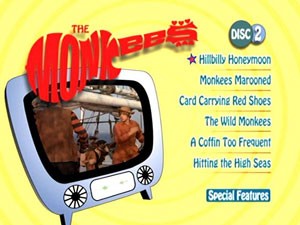 The Discs
The Discs
The 25 episodes that made up the second season of The Monkees are spread across five DVDs, which are packed in a three tray digipak (with two discs overlapping on the second two trays). Behind the discs is episode info, including airdates and songs, while an essay by Andrew Sandoval goes behind the scenes of the second season on the back of the third panel. Each disc's full-frame animated menu features options to to select episodes (with an episode sub-menu beyond that) and check out the extras (no play-all option is available.) Audio options include Dolby Digital 5.1 and 2.0 tracks, but there are no subtitles or closed captioning.
The Quality
After a good, but flawed presentation on the first sets, these slightly younger episodes have a better all-around look to them, with less of the harsh dirt and damage and uneven color and brightness seen in the first season (though the use of different film stocks and lighting set-ups, like on "The Monkees in Paris" and other "documentary" episodes, results in some wildly different looks.) The full-frame transfers certainly show their age, but they still look pretty good, especially in terms of the color and level of fine detail.
There's not really any difference between these tracks and those on the first set, as the Dolby Digital 5.1 tracks remain a bit hollow, as an attempt to fill the room with sound results in each speaker creating more of an echo than a force. The straight-down-the middle 2.0 tracks focus the sound better, and replicate the original presentation more directly. The audio is good overall, with the songs are strong , and distortion-free dialogue.
The Extras
Each episode offers trivia text screens, courtesy of Aaron Handy III (and his now defunct website), which offer plenty of info, but much of it will be of interest mainly to die-hard fans. There's more inside story available in eight solo audio commentaries (all from the original 2003 DVDs) which are honest and informative, with Rafelson bringing the most details to the table and Nesmith bringing the most insight into what was going on in the production (his track on "The Monkees Blow Their Minds" is almost depressing in its frankness about the show's downfall.) The only downside is in Dolenz' track, where he feels the need to be "on," acting wacky and cracking jokes constantly. That, and the fact that they couldn't get the band back together for a group commentary.
- "Hitting the High Seas"
- Davy Jones
- "Fairy Tale"
- Peter Tork
- Michael Nesmith
- "The Devil and Peter Tork"
- Tork
- "The Monkees in Paris"
- Creator/director Bob Rafelson
- "The Monkees Mind Their Manor"
- Tork
- "The Monkees Blow Their Minds"
- Nesmith
- "Mijacogeo - The Frodis Caper"
- Mickey Dolenz
Like last time, there's an option to play all the "romps" of that disc in one reel. The problem that plagued the first season romps is less of an issue this time, but there's still some repetition in the songs on each disc.
The gem of the extras has to be "33 1/3 Revolutions Per Monkee" the group's 1969 NBC TV special, which is just loaded with nearly 53 minutes of psychedelic madness centered around the concept of evolution, but far less of the music goodness you'd expect from The Monkees, with just one of the band's hits, and that one, "I'm a Believer," is performed by Dolenz in an R&B duet with guest star Julie Driscoll. There's also none of the comedy that was the group's trademark, which makes it even more foreign to the show's fans. However, there are some great musical moments, thanks to a great performance by the quartet on a medley of '50s songs and appearances by Little Richard, Fats Domino, Jerry Lee Lewis and the Clara Ward Singers, including a short but ambitious scene where four pianos are stacked on top of each other, played by British musician Brian Augen, Lewis, Richard and Domino. It's hardly a Monkees affair, but it's fascinating nonetheless.
In support of the special, you get another set of those informative trivia screens, as well as a pair of commentaries, one by Augen, and one by Dolenz. Despite some dead air and occasional repeats, Augen provides a ton of background info for the special, including stories of his first visit to America and his time with the Monkees off-set, while Dolenz watches along, throwing in random memories, but mainly goofing on the proceedings. At least he's honest about it.
The extras continue with an 18-minute chat with editor Jerry Shepard. Like the interview on the first set, this one is a bit dry, but if you have any interest in the art of editing, Shepard offers lots of thoughts on the topic and notes from his experiences. That's followed by a photo gallery (that pales in comparison with the first set's, as there's just one brief piece of studio correspondence.) The bonus material wraps with some archival footage, with a clip of the Monkees in New York City from NBC News (circa 1967) and two appearances on the Glen Campbell Goodtime Hour, from 1969. This footage is disappointing for two reasons. First, the news footage, which includes them taking questions about a rumored break-up, is very short, while the Glen Campbell scenes just aren't very good.
Though the box lists "Vintage Monkees Kellogg's Commercials," they aren't here, and the listing seems to be a holdover from the first season's packaging.
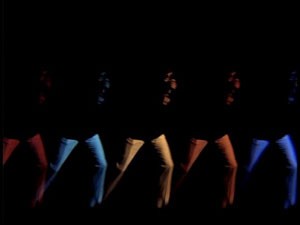 The Bottom Line
The Bottom Line
It's unlikely anyone will buy the more far-out second season of The Monkees without first picking up the first season, so that review is the key one, but that said, there's a definite reason to check out Season Two on its own, and that is the inclusion of the incredibly odd 1969 TV special as an extra. Besides that, these episodes look better, and unlike the first season, Micky Dolenz is involved in the extras, so fans looking to get a taste of everything Monkees will find this set satisfies nicely.
Francis Rizzo III is a native Long Islander, where he works in academia. In his spare time, he enjoys watching hockey, writing and spending time with his wife, daughter and puppy.Follow him on Twitter
*The Reviewer's Bias section is an attempt to help readers use the review to its best effect. By knowing where the reviewer's biases lie on the film's subject matter, one can read the review with the right mindset.
|
| Popular Reviews |
| Sponsored Links |
|
|
| Sponsored Links |
|
|
| Release List | Reviews | Shop | Newsletter | Forum | DVD Giveaways | Blu-Ray | Advertise |
|
Copyright 2024 DVDTalk.com All Rights Reserved. Legal Info, Privacy Policy, Terms of Use,
Manage Preferences,
Your Privacy Choices | |||||||









